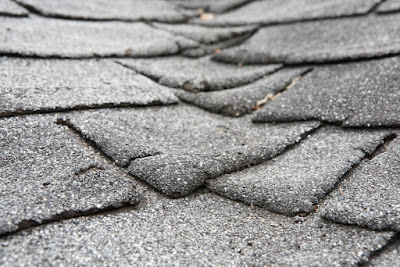6 Signs Your Roof Needs Repaired
By making necessary roof repairs when they appear, you can greatly reduce the costs associated with roofing problems. Replacing your entire roof is something you don't want to deal with, so making necessary repairs early can help you avoid this large expense. How do you know if your roof needs repaired though? In today's blog, your Lake of the Ozarks roofing company offers a few signs to look for.
Curled shingles are a sign of both aging and excessive heat. These shingles are highly susceptible to wind uplift and ice damage. If just the corners of the shingles are curling, you won't need to replace the entire roof yet. Sometimes the south-facing side will be the only one with heat damage, and therefore you can just replace or repair the one side.
A few cracked shingles should be replaced before the problem expands. Replacing missing or damaged shingles is relatively easy and inexpensive compared to a complete re-roof. Torn or damaged shingles that are limited to a specific area can be removed and new ones can be installed in their place.
Buckling shingles are visible waved distortions that typically run vertically up a roof slope. They are highly susceptible to wind and ice damage, and can be easily torn off. Wet or poorly installed underlayment is often the culprit in these situations. If you notice buckled shingles in just one area, your Lake of the Ozarks roofer can repair the spot for you to avoid further damage that could lead to a re-roof.
As asphalt shingles age, they begin to lose some of their granules. While this is normal, if you see an excessive amount of granules in your gutters, there might be more of an issue than just aging. Look to see if the bare spot is limited to a certain area, maybe physical damage such as a tree limb scraping across the roof is the cause of granule loss. If this is the case, you might be able to replace just the shingles in that area that are missing granules. Shingles without granules are weaker and can become an entry point for water.
Damaged flashing creates an easy entry point for water. Inspect flashing areas around skylights, valleys, eaves, rakes, wall details, stacks and chimneys for separation, lifting or dried out caulking. Flashing can lift and separate due to general expansion and contraction. Make sure your flashing is repaired/replaced before winter weather arrives to avoid water damage to your home.
In addition to looking at the condition of your roof from the outside, you should inspect your attic. If you notice any signs that water may be getting in, you'll want to investigate where the problem is originating. Things to look for include: a bowed or sagging roof, water stains, wet insulation, spots where light is shining in, and/or any mold or rotted wood. If you roof is leaking in just one spot, chances are you can have just that area repaired.
Now is the time to get any necessary Lake of the Ozarks roof repairs completed, before the winter weather arrives! Give Above & Beyond Roofing a call at 573-302-0354. If you are unsure about the condition of your roof, have us come out for a FREE roof inspection at the Lake of the Ozarks!
1. Curling Shingles
Curled shingles are a sign of both aging and excessive heat. These shingles are highly susceptible to wind uplift and ice damage. If just the corners of the shingles are curling, you won't need to replace the entire roof yet. Sometimes the south-facing side will be the only one with heat damage, and therefore you can just replace or repair the one side.
2. Damaged or Missing Shingles
A few cracked shingles should be replaced before the problem expands. Replacing missing or damaged shingles is relatively easy and inexpensive compared to a complete re-roof. Torn or damaged shingles that are limited to a specific area can be removed and new ones can be installed in their place.
3. Buckling Shingles
Buckling shingles are visible waved distortions that typically run vertically up a roof slope. They are highly susceptible to wind and ice damage, and can be easily torn off. Wet or poorly installed underlayment is often the culprit in these situations. If you notice buckled shingles in just one area, your Lake of the Ozarks roofer can repair the spot for you to avoid further damage that could lead to a re-roof.
4. Missing Granules
As asphalt shingles age, they begin to lose some of their granules. While this is normal, if you see an excessive amount of granules in your gutters, there might be more of an issue than just aging. Look to see if the bare spot is limited to a certain area, maybe physical damage such as a tree limb scraping across the roof is the cause of granule loss. If this is the case, you might be able to replace just the shingles in that area that are missing granules. Shingles without granules are weaker and can become an entry point for water.
5. Damaged Flashing
Damaged flashing creates an easy entry point for water. Inspect flashing areas around skylights, valleys, eaves, rakes, wall details, stacks and chimneys for separation, lifting or dried out caulking. Flashing can lift and separate due to general expansion and contraction. Make sure your flashing is repaired/replaced before winter weather arrives to avoid water damage to your home.
6. Signs of Leaking or Water Damage
In addition to looking at the condition of your roof from the outside, you should inspect your attic. If you notice any signs that water may be getting in, you'll want to investigate where the problem is originating. Things to look for include: a bowed or sagging roof, water stains, wet insulation, spots where light is shining in, and/or any mold or rotted wood. If you roof is leaking in just one spot, chances are you can have just that area repaired.
Now is the time to get any necessary Lake of the Ozarks roof repairs completed, before the winter weather arrives! Give Above & Beyond Roofing a call at 573-302-0354. If you are unsure about the condition of your roof, have us come out for a FREE roof inspection at the Lake of the Ozarks!
Be sure to LIKE us on Facebook, Follow us on Twitter, Connect with Melissa on LinkedIn and Subscribe to our Blog!!
"IF IT NEEDS A ROOF WE CAN DO IT ...
1212 SPRING VALLEY RD







A roof is one of the most crucial elements of a house as it is responsible for providing complete shelter from the harshest of elements and maintains the lovely exteriors.
ReplyDeletePolycarbonate Greenhouse Panels
thanks for the tips. I have been using roofing philadelphia for many years now
ReplyDelete